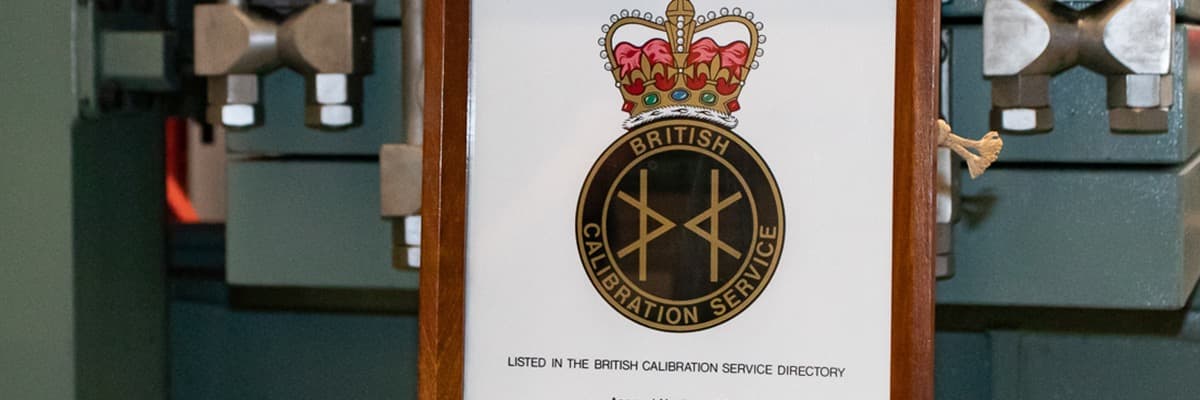Weighing up the benefits of an accredited calibration laboratory

When it comes to choosing a metrology calibration service that fits your needs, there are usually two options available: traceable and accredited. Choosing between the two can make things oddly daunting, but it goes without saying you’ll want to ensure that your metrology equipment is measuring correctly.
So, what tips the balance in favour of an accredited laboratory?
Firstly, what exactly is accreditation?
Accreditation is in place to certify ‘technical competence’.
Put simply, accreditation ensures that a set of standards are being met and provides the evidence that they are. To achieve this, a laboratory has to be independently audited to demonstrate that they can carry out calibration work competently.
In essence, it shows that the laboratories in charge of calibrating your metrology equipment have themselves undergone a rigorous checking process.
Accreditation is an instantly recognisable stamp of approval and probably the best indication of the quality and competence of a supplier’s calibration services. It gives you confidence that calibration results will be fully traceable to international reference standards through the complex traceability chain.
How are laboratories accredited?
To gain accreditation, laboratories are audited against recognised standards by appointed bodies.
UKAS is the National Accreditation Body for the United Kingdom. They are appointed by government, to assess and accredit organisations that provide services including certification, testing, inspection and calibration.
To gain UKAS accreditation, laboratories have to be audited against a scrupulous set of criteria defined by the internationally recognised standard ISO/IEC 17025:2017. It is an expensive and time-consuming process, but it examines everything from test methods and equipment, to staff, their training and technical capabilities. Ensuring quality across the board here is key.
More importantly, it provides evidence that the laboratory can consistently obtain accurate and reliable calibration results, which are recognised both nationally and around the world.
A ‘UKAS calibration’ refers to a calibration carried out by a UKAS accredited laboratory within the scope of their accreditation.
It’s important to remember accreditation is not a one-off achievement. Accredited laboratories are regularly audited to ensure their ongoing technical competence.
ISO/IEC 17025:2017 vs ISO 9001:2015 – why standards matter
While ISO 9001:2015 can contribute to maintaining high quality standards in laboratories, it’s important to note that it more generically focuses on compliance to general quality management systems.
ISO 17025:2017, on the other hand, exists to provide specific guidance on the specialist quality management systems required by testing and calibration laboratories.
In essence, ISO 9001:2015 is broader as it does not require evaluation of the technical competence of a laboratory or its staff, whereas ISO 17025:2017 shows their ability to carry out calibration work to the highest standard.
As far as standards go, ISO 17025:2017 is necessary for formal recognition of a laboratory’s calibration capabilities. This is the standard you should look for.
What value does an ISO 17025:2017 accredited lab create for metrology equipment calibrations?
There are two main routes to calibration: accredited calibration (UKAS calibration) and standard traceable calibration (non-accredited calibration).
An accredited calibration shows that a laboratory meets the stringent requirements of ISO 17025:2017. A standard calibration refers to the service of laboratories whose competence has not been formally confirmed by an independent party.
UKAS calibration exists to give you the highest degree of assurance that you will receive accurate results and, just as importantly, can pass this down to your customers.
When it comes to ensuring the most accurate results, an accredited laboratory is there to take some of the weight off your shoulders. Here are some other important benefits of using an accredited metrology lab:
- Enhance your confidence – Using an accredited laboratory means putting your confidence into a laboratory that has been certified as technically competent.
- Minimise risk – The accuracy of the calibration results obtained from an accredited laboratory can minimise the risk of producing or supplying a faulty product as you can be confident your metrology equipment will be providing accurate results.
- Avoid expensive re-testing – Calibrating metrology equipment can be expensive and time-consuming. If not done correctly the first time, the time and costs involved in re-testing can end up costing you a fortune.
- International recognition – Accredited laboratories receive a form of international recognition. This helps to reduce costs by reducing or eliminating the need for retesting overseas.
Some industries also have regulations that require accredited calibration results for metrology equipment. Industries such as automotive, healthcare, aerospace, and aviation all require extreme accuracy. UKAS Accreditation ensures the highest standard of quality in calibration with assured traceability to National and International Standards.
All calibration laboratories accredited to ISO/IEC 17025:2017 are listed on the UKAS website. You can also check the company website or ask the supplier for their laboratory number to verify their credentials.
Finally, it’s also important to confirm that your equipment is included within the calibration laboratory’s ‘Scope of Accreditation’. This is an official document issued for every accredited laboratory and provides a list of calibration activities that it is accredited to perform.
An accredited calibration partner…
Many aspects of the core disciplines (electrical, mass weights, force, pressure, temperature and torque) of our metrology equipment calibration service, Calibration Select, are accredited by UKAS to enable us to provide UKAS Calibration Certificates.
We are additionally able to offer standard traceable calibration in both these and other disciplines. For full details of our UKAS accreditation, please refer to our Accreditation Scopes, available on the UKAS website.
After your equipment has been calibrated, we provide you with a UKAS calibration certificate which shows the results from your calibration, including any measurement uncertainties and other information required by the standard ISO/IEC 17025:2017. This is in addition to all the information you would get from a non-accredited calibration.
If you would like more information on UKAS accredited calibration service, please get in touch, we’d love to hear from you.
